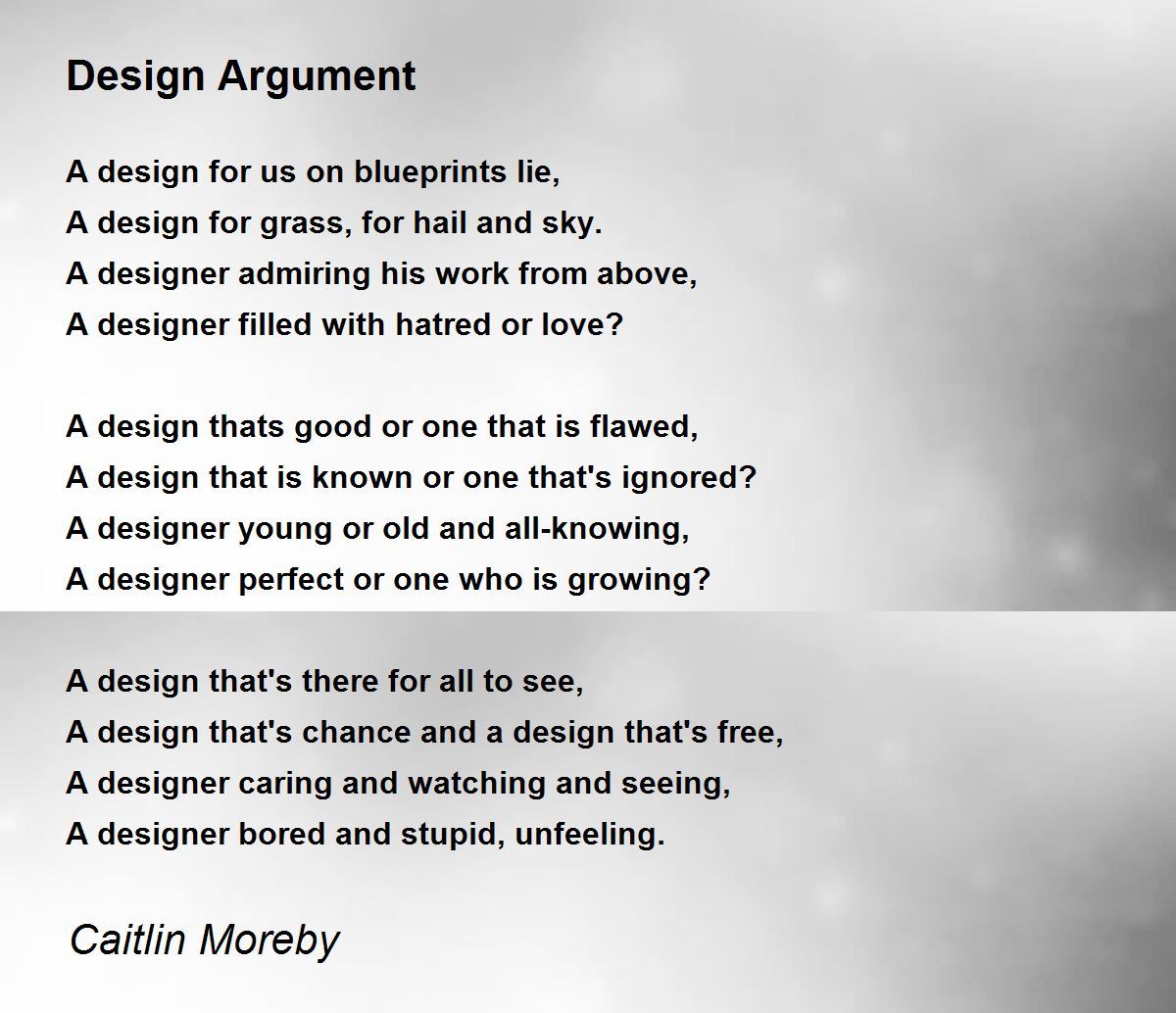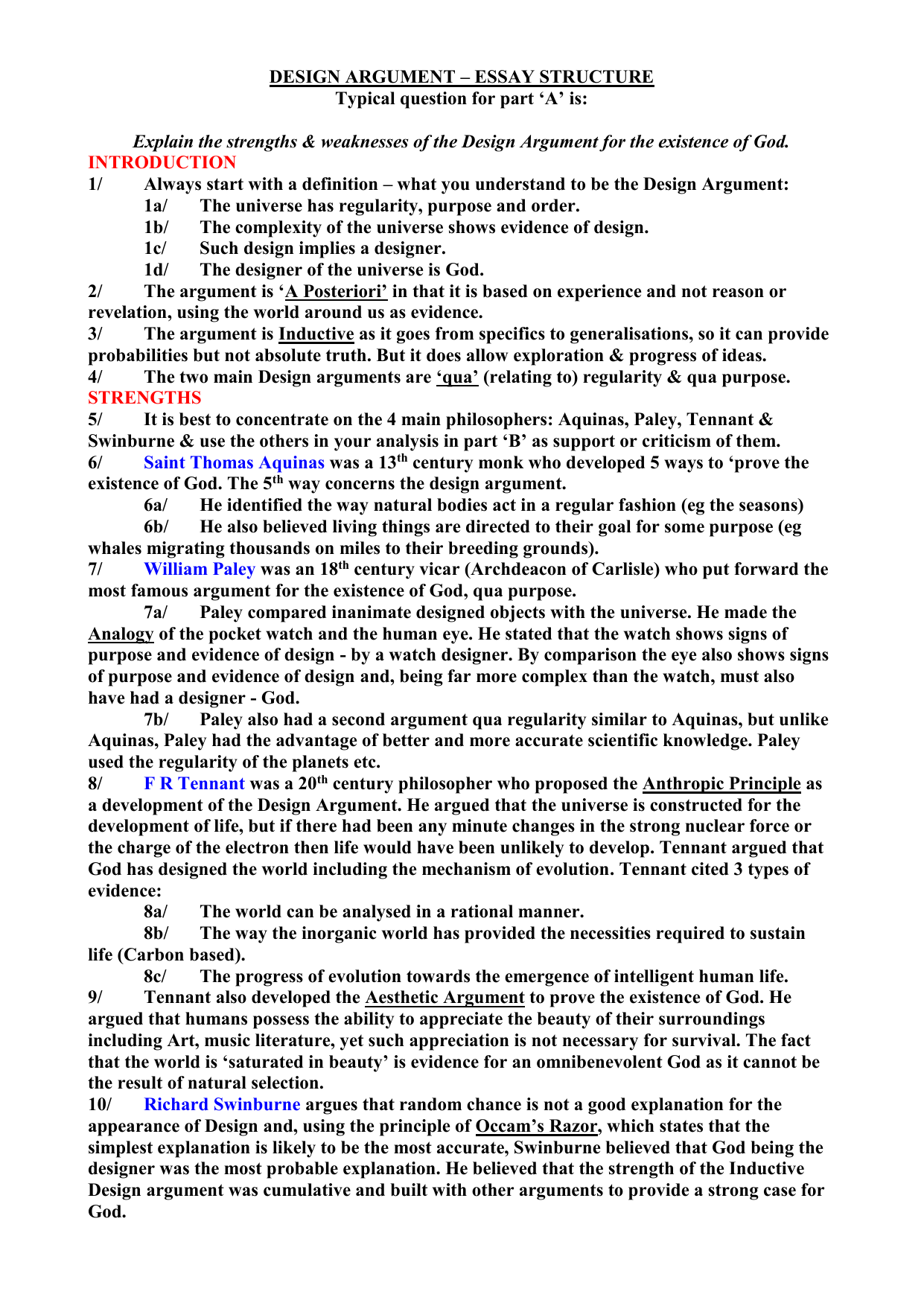Table Of Content

Similarly, if we already have adequate reason to believe that God exists, then design inferences can enable us to distinguish features of the world that merely happen from features of the world that are deliberately brought about by the agency of God. Indeed, to the extent that we are antecedently justified in believing that God exists, it is obviously more reasonable to believe that God deliberately structured the universe to have the fine-tuned properties than it is to believe that somehow this occurred by chance. At the outset, it is crucial to note that Collins does not intend the fine-tuned argument as a proof of God’s existence. As he explains, the Prime Principle of Confirmation “is a general principle of reasoning which tells us when some observation counts as evidence in favor of one hypothesis over another” (Collins 1999, 51). Indeed, he explicitly acknowledges that “the argument does not say that the fine-tuning evidence proves that the universe was designed, or even that it is likely that the universe was designed” (Collins 1999, 53). It tells us only that the observation of fine-tuning provides one reason for accepting the Theistic Hypothesis over the Atheistic Single-Universe Hypothesis—and one that can be rebutted by other evidence.
Design Arguments for the Existence of God
In fitness landscape terms, natural selection will always push "up the hill", but a species cannot normally get from a lower peak to a higher peak without first going through a valley. Brown, in his 1943 book ‘Footprints of God’, examined the ozone layer and how it is the exact thickness for its purpose. Examples of this could be the sky, the human brain, even emotions – the concept would say that if things exist they must have a designer. The second program incorporates a “cumulative-step selection mechanism.” It begins by randomly generating a 28-character sequence of letters and spaces and then “breeds” from this sequence in the following way. For a specified period of time, it generates copies of itself; most of the copies perfectly replicate the sequence, but some copies have errors (or mutations).
'Where Are the Designers on This?': Some Post-Argument Thoughts on LKQ vs. GM - IPWatchdog.com
'Where Are the Designers on This?': Some Post-Argument Thoughts on LKQ vs. GM.
Posted: Mon, 19 Feb 2024 08:00:00 GMT [source]
The Ontological Argument for God

Every indicator of contrivance, every manifestation of design, which existed in the watch, exists in the works of nature; with the difference, on the side of nature, of being greater and more, and that in a degree which exceeds all computation. Therefore some intelligent being exists by whom all natural things are directed to their end; and this being we call God (Aquinas, Summa Theologica, Article 3, Question 2). In this context, it is also worth noting Paley’s view on extinction—namely that it does not happen. According to Paley, the classification of species into larger taxa would be rendered impossible by widespread extinction. In contrast, extinction was established as a common process in the history of life by Darwin’s time, and today it is acknowledged that the overwhelming majority of species that have existed no longer grace the Earth. In fact, the major divisions among extant lineages are now understood to exist precisely because so many ancestors and intermediate forms have perished.
Contradictory premises lead to an infinite regress[change change source]
Assuming the Design Hypothesis is true, the probability that the universe has the fine-tuned properties approaches (if it does not equal) 1. Assuming the Atheistic Single-Universe Hypothesis is true, the probability that the universe has the fine-tuned properties is very small—though it is not clear exactly how small. Applying the Prime Principle of Confirmation, Collins concludes that the observation of fine-tuned properties provides reason for preferring the Design Hypothesis over the Atheistic Single-Universe Hypothesis.
Stephen Meyer Proposes God as a Conclusion of Science - Juicy Ecumenism
Stephen Meyer Proposes God as a Conclusion of Science.
Posted: Wed, 16 Aug 2023 07:00:00 GMT [source]
Nevertheless, the confirmatory version of the argument is vulnerable on other fronts. As a first step towards seeing one worry, consider two possible explanations for the observation that John Doe wins a 1-in-7,000,000 lottery (see Himma 2002). According to the Theistic Lottery Hypothesis, God wanted John Doe to win and deliberately brought it about that his numbers were drawn. According to the Chance Lottery Hypothesis, John Doe’s numbers were drawn by chance. It is clear that John’s winning the lottery is vastly more probable under the Theistic Lottery Hypothesis than under the Chance Lottery Hypothesis. By the Prime Principle of Confirmation, then, John’s winning the lottery provides a reason to prefer the Theistic Lottery Hypothesis over the Chance Lottery Hypothesis.
It is absurd to think that a thing does not happen for the sake of something if we do not see what sets it in motion deliberating. This is most clear when someone practices medicine himself on himself; for nature is like that. If we see a house,… we conclude, with the greatest certainty, that it had an architect or builder because this is precisely that species of effect which we have experienced to proceed from that species of cause. But surely you will not affirm that the universe bears such a resemblance to a house that we can with the same certainty infer a similar cause, or that the analogy is here entire and perfect (Hume, Dialogues, Part II).
In the absence of some further information about the probability that such an agent exists, we cannot legitimately infer design as the explanation of irreducible biochemical complexity. There are thus two features of a watch that reliably indicate that it is the result of an intelligent design. First, it performs some function that an intelligent agent would regard as valuable; the fact that the watch performs the function of keeping time is something that has value to an intelligent agent. Taken together, these two characteristics endow the watch with a functional complexity that reliably distinguishes objects that have intelligent designers from objects that do not.
thoughts on “The Design Argument — six critical questions”
It is controversial, however, whetherthis idea can coherently be fleshed out in terms of any philosophicalaccount of probability. While Schlesinger is undoubtedly correct in thinking that we are justified in suspecting design in the case [of winning] three consecutive lotteries, it is because—and only because—we know two related empirical facts about such events. First, we already know that there exist intelligent agents who have the right motivations and causal abilities to deliberately bring about such events. Second, we know from past experience with such events that they are usually explained by the deliberate agency of one or more of these agents. Without at least one of these two pieces of information, we are not obviously justified in seeing design in such cases ...
6: Argument from Design (Noah Levin)
The argument from biological information, like the argument from biochemical complexity, seems incapable of standing alone as an argument for God’s existence. While the argument from irreducible biochemical complexity focuses on the probability of evolving irreducibly complex living systems or organisms from simpler living systems or organisms, the argument from biological information focuses on the problem of generating living organisms in the first place. Darwinian theories are intended only to explain how it is that more complex living organisms developed from primordially simple living organisms, and hence do not even purport to explain the origin of the latter. The argument from biological information is concerned with an explanation of how it is that the world went from a state in which it contained no living organisms to a state in which it contained living organisms; that is to say, it is concerned with the explanation of the very first forms of life.
Maybe you were feeling inquisitive, and you opened the watch (it was an old-fashioned pocket watch). Considering the way that all the mechanical parts worked together toward the end/goal of telling time, you would be reluctant to say that the watch was not created by a designer. TheR-exhibiting things concerning which we knew whether theywere designed would be almost without exception human artifacts,whereas the phenomena to which the generalization was being extendedwould be things in nature. And, of course, the generalization inquestion could establish at best a probability, and a fairly modestone at that. For this reason, the confirmatory version of the fine-tuning argument, by itself, provides a weak reason for preferring the Design Hypothesis over the Atheistic Single Universe Hypothesis. Although Collins is certainly correct in thinking the observation of fine-tuning provides a reason for accepting the Design Hypothesis and hence rational ground for belief that God exists, that reason is simply not strong enough to do much in the way of changing the minds of either agnostics or atheists.
[T]he existence of order in the world confirms the existence of God if and only if the existence of this order in the world is more probable if there is a God than if there is not. The probability of order of the right kind is very much greater if there is a God, and so that the existence of such order adds greatly to the probability that there is a God. For who but an intelligent Being, what less than an omnipotent and infinitely wise God could contrive, and make such a fine Body, such a Medium, so susceptible of every Impression, that the Sense of Hearing hath occasion for, to empower all Animals to express their Sense and Meaning to others. If then what comes from art is for the sake of something, it is clear that what come from nature is too ... This is clear most of all in the other animals, which do nothing by art, inquiry, or deliberation; for which reason some people are completely at a loss whether it is by intelligence or in some other way that spiders, ants, and such things work.

No comments:
Post a Comment